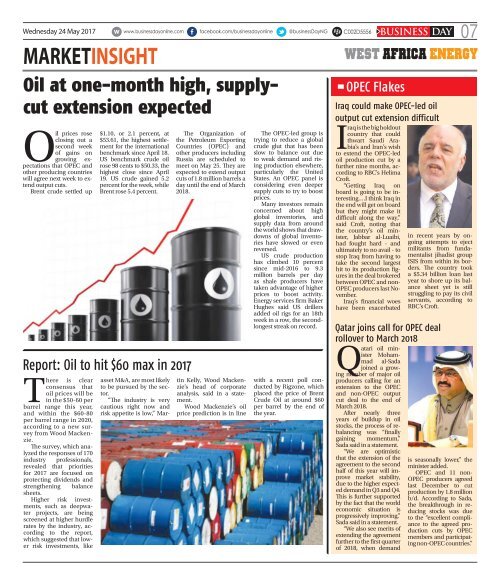BusinessDay 24 May 2017
You also want an ePaper? Increase the reach of your titles
YUMPU automatically turns print PDFs into web optimized ePapers that Google loves.
Wednesday <strong>24</strong> <strong>May</strong> <strong>2017</strong><br />
marketinsight<br />
Oil at one-month high, supplycut<br />
extension expected<br />
Oil prices rose<br />
closing out a<br />
second week<br />
of gains on<br />
growing expectations<br />
that OPEC and<br />
other producing countries<br />
will agree next week to extend<br />
output cuts.<br />
Brent crude settled up<br />
There is clear<br />
consensus that<br />
oil prices will be<br />
in the $50-60 per<br />
barrel range this year,<br />
and within the $60-80<br />
per barrel range in 2020,<br />
according to a new survey<br />
from Wood Mackenzie.<br />
The survey, which analyzed<br />
the responses of 170<br />
industry professionals,<br />
revealed that priorities<br />
for <strong>2017</strong> are focused on<br />
protecting dividends and<br />
strengthening balance<br />
sheets.<br />
Higher risk investments,<br />
such as deepwater<br />
projects, are being<br />
screened at higher hurdle<br />
rates by the industry, according<br />
to the report,<br />
which suggested that lower<br />
risk investments, like<br />
$1.10, or 2.1 percent, at<br />
$53.61, the highest settlement<br />
for the international<br />
benchmark since April 18.<br />
US benchmark crude oil<br />
rose 98 cents to $50.33, the<br />
highest close since April<br />
19. US crude gained 5.2<br />
percent for the week, while<br />
Brent rose 5.4 percent.<br />
Report: Oil to hit $60 max in <strong>2017</strong><br />
asset M&A, are most likely<br />
to be pursued by the sector.<br />
“The industry is very<br />
cautious right now and<br />
risk appetite is low,” Mar-<br />
The Organization of<br />
the Petroleum Exporting<br />
Countries (OPEC) and<br />
other producers including<br />
Russia are scheduled to<br />
meet on <strong>May</strong> 25. They are<br />
expected to extend output<br />
cuts of 1.8 million barrels a<br />
day until the end of March<br />
2018.<br />
tin Kelly, Wood Mackenzie’s<br />
head of corporate<br />
analysis, said in a statement.<br />
Wood Mackenzie’s oil<br />
price prediction is in line<br />
The OPEC-led group is<br />
trying to reduce a global<br />
crude glut that has been<br />
slow to balance out due<br />
to weak demand and rising<br />
production elsewhere,<br />
particularly the United<br />
States. An OPEC panel is<br />
considering even deeper<br />
supply cuts to try to boost<br />
prices.<br />
Many investors remain<br />
concerned about high<br />
global inventories, and<br />
supply data from around<br />
the world shows that drawdowns<br />
of global inventories<br />
have slowed or even<br />
reversed.<br />
US crude production<br />
has climbed 10 percent<br />
since mid-2016 to 9.3<br />
million barrels per day<br />
as shale producers have<br />
taken advantage of higher<br />
prices to boost activity.<br />
Energy services firm Baker<br />
Hughes said US drillers<br />
added oil rigs for an 18th<br />
week in a row, the secondlongest<br />
streak on record.<br />
with a recent poll conducted<br />
by Rigzone, which<br />
placed the price of Brent<br />
Crude Oil at around $60<br />
per barrel by the end of<br />
the year.<br />
C002D5556<br />
BUSINESS DAY<br />
07<br />
WEST AFRICA ENERGY<br />
OPEC Flakes<br />
Iraq could make OPEC-led oil<br />
output cut extension difficult<br />
Iraq is the big holdout<br />
country that could<br />
thwart Saudi Arabia’s<br />
and Iran’s wish<br />
to extend the OPEC-led<br />
oil production cut by a<br />
further nine months, according<br />
to RBC’s Helima<br />
Croft.<br />
“Getting Iraq on<br />
board is going to be interesting….I<br />
think Iraq in<br />
the end will get on board<br />
but they might make it<br />
difficult along the way,”<br />
said Croft, noting that<br />
the country’s oil minister,<br />
Jabbar al-Luaibi,<br />
had fought hard - and<br />
ultimately to no avail - to<br />
stop Iraq from having to<br />
take the second largest<br />
hit to its production figures<br />
in the deal brokered<br />
between OPEC and non-<br />
OPEC producers last November.<br />
Iraq’s financial woes<br />
have been exacerbated<br />
Qatari oil minister<br />
Mohammad<br />
al-Sada<br />
joined a growing<br />
number of major oil<br />
producers calling for an<br />
extension to the OPEC<br />
and non-OPEC output<br />
cut deal to the end of<br />
March 2018.<br />
After nearly three<br />
years of buildup in oil<br />
stocks, the process of rebalancing<br />
was “finally<br />
gaining momentum,”<br />
Sada said in a statement.<br />
“We are optimistic<br />
that the extension of the<br />
agreement to the second<br />
half of this year will improve<br />
market stability,<br />
due to the higher expected<br />
demand in Q3 and Q4.<br />
This is further supported<br />
by the fact that the world<br />
economic situation is<br />
progressively improving,”<br />
Sada said in a statement.<br />
“We also see merits of<br />
extending the agreement<br />
further to the first quarter<br />
of 2018, when demand<br />
in recent years by ongoing<br />
attempts to eject<br />
militants from fundamentalist<br />
jihadist group<br />
ISIS from within its borders.<br />
The country took<br />
a $5.34 billion loan last<br />
year to shore up its balance<br />
sheet yet is still<br />
struggling to pay its civil<br />
servants, according to<br />
RBC’s Croft.<br />
Qatar joins call for OPEC deal<br />
rollover to March 2018<br />
is seasonally lower,” the<br />
minister added.<br />
OPEC and 11 non-<br />
OPEC producers agreed<br />
last December to cut<br />
production by 1.8 million<br />
b/d. According to Sada,<br />
the breakthrough in reducing<br />
stocks was due<br />
to the “excellent compliance<br />
to the agreed production<br />
cuts by OPEC<br />
members and participating<br />
non-OPEC countries.”


















